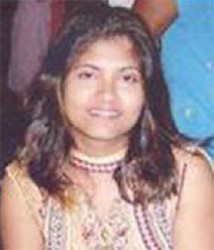The group aiming to reopen the investigation of Babita Sarjou’s disappearance remains optimistic as it awaits confirmation of the case’s reopening and is proposing that special legislation be passed as regards missing persons.
Programme Director of Caribbean American Dom-estic Violence Awareness (CADVA) group Diane Madray related

that there were two meetings with the Crime Chief Leslie James last week.
One meeting included Sarjou’s mother, Champa Seenarine.
According to Madray, they were told by the James that they needed to submit an addendum requesting the reopening of the case. She said they are optimistic and will not quit until Sarjou is reunited with her family.
James yesterday told Stabroek News that he has already submitted the request and is currently awaiting confirmation from the Director of Public Prosecutions (DPP) on how to proceed.
Madray has informed Stabroek News that they have a team of lawyers ready as soon as they receive confirmation from the Crime Chief. CADVA is also aiming to get an overseas private investigation agency to assist in the investigation.
In a recent interview, Madray noted that there is no missing persons’ law, only an Evidence Act; she therefore is proposing that this be remedied.
At the vigil held recently to mark the fourth year since Sarjou’s disappearance, attorney Khemraj Ramjattan said he was one of the persons who wrote to the DPP in 2012 for there to be consideration of some of the DNA evidence and he was informed that something would be done, but has since been no response.
“We need to start thinking of specialised legislation for persons who have disappeared and on that score, we plan to ask the Commonwealth whether there is … some blueprint legislation that is already in some Commonwealth countries, that we can utilise… with the necessary modifications and adaptations to apply to Guyana,” Ramjattan who is also the leader of the Alliance For Change party said. “…I think Guyana has started the process of an initial draft. I would like to see it and merge with what the Commonwealth would have [provided] and so that we can probably get that legislation laid and passed [in Parliament],” Ramjattan added.
“As a society, the way we view a report of a missing person is judgmental. When a woman is missing the community is quick to judge that she left with a man,” Madray said.
Sarjou, then 28, left her Timehri home on the eve of Diwali on November 4, 2010, informing her family that after work she was going to view the annual motorcade with her estranged husband and four-year-old son. She was never seen again.









